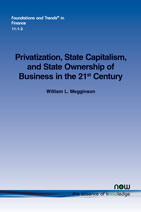Privatization, State Capitalism, and State Ownership of Business in the 21st Century
By William L. Megginson, University of Oklahoma, USA, wmegginson@ou.edu
Abstract
This study summarizes the economic and political developments relating to privatization, state capitalism, and state ownership of business since 2000 and then surveys the extensive recent research examining these issues empirically. Through the early 21st century, there was an unambiguous global trend towards reducing government ownership of business enterprise, but this trend has since at least been slowed, and perhaps even reversed. We discuss the factors that have promoted a global resurgence of state ownership, then define and analyze the new ideology labeled “state capitalism.” Recent research examines whether privatization improves the operating and financial performance of divested companies, as well as when, where and how governments decide to privatize individual companies and how these sales are priced. All the performance studies surveyed document significant improvements after companies are divested. Recent academic and professional research categorizes and evaluates various types of state owners; examines determinants of the level of state ownership; studies how state ownership impacts the valuation of corporate assets and examines the relative efficiency of state versus private ownership; and assesses how state ownership impacts corporate financial policies, especially capital investment. This research highlights that different types of state owners have very different impacts on corporate value and performance, and that state ownership generally has a significant, and mostly pernicious, impact on corporate investment and financial policies. The separate effect of state ownership on corporate valuation is less clear-cut. This survey also summarizes recent empirical research examining the relationship between state ownership of business assets and financial markets and institutions, and also surveys the literature examining political connections between politicians and corporate managers. Sovereign wealth fund research yields essentially benign findings, but almost all studies examining state-owned banking show that state ownership reduces banks’ efficiency. All the financial markets and institutions studies examined highlight the distortive effects and economic costs of bailouts and guarantees, and almost all the political connections studies find that these connections are privately beneficial but socially costly. Finally, the research surveyed here convinces the author that “state capitalism” is an essentially failed model.
Privatization, State Capitalism, and State Ownership of Business in the 21st Century
Privatization, State Capitalism, and State Ownership of Business in the 21st Century provides an overview of economic and political developments relating to privatization, state capitalism, and state ownership of business, and will then survey the extensive recent research examining privatization and state ownership. The author adopts a policy of categorizing the post-2004 research into three principal areas: (1) empirical privatization studies; (2) theoretical and empirical studies examining the level, type, and valuation impact of state ownership of business enterprises; and (3) empirical research examining the impact of state ownership on financial markets and institutions, plus the private and public social welfare implications of political connections between politicians and business executives.
Privatization, State Capitalism, and State Ownership of Business in the 21st Century starts by surveying the recent empirical privatization research. Second, Section 3 summarizes the empirical and theoretical research examining the level, type, and valuation impact of state ownership in the world’s major economic regions. This summary will also assess research examining the relative efficiency of state versus private ownership, and the effect of state ownership on observed corporate financial policies. Section 4 summarizes the empirical research examining the intersection of state ownership and finance. This will begin with the literature assessing the rise of sovereign wealth funds, then will survey research examining the efficiency of state owned banks, and will conclude by summarizing research questioning the private and public social welfare implications of political connections between politicians and business executives. Section 5 provides the author’s concluding statements.
